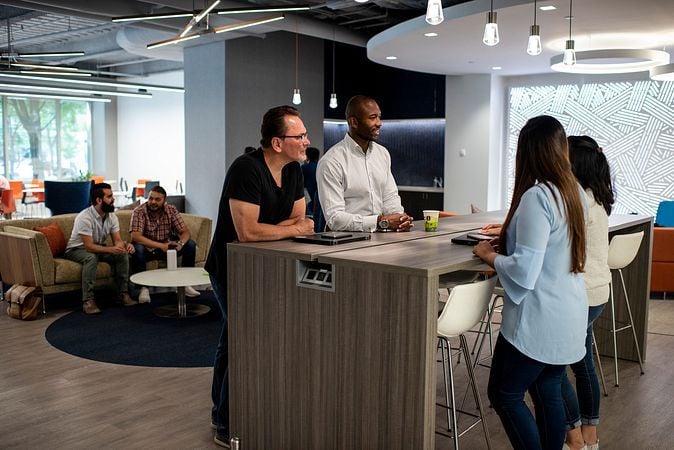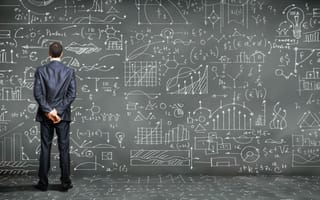Machines can’t do it all.
Even with everyday advancements in the world of artificial intelligence, we don’t expect computers to make calculations, adjust functions, report data in real time and also hold empathetic conversations about how our day went.
So why should we expect the same out of data scientists? After all, hard skills like coding and analysis involve precise calculations that require accurate and timely mental prowess to complete. Running these teams like an efficient machine shouldn’t require soft traits like curiosity, communication and problem-solving, right?
According to Sharon Philip, senior data scientist at The Kraft Heinz Company, that’s where we’re wrong. She explained that non-technical skills like organization, adaptability and storytelling help set up teams for something more, and turn experience-based insights into actionable change that would not be possible with technical abilities alone.
“Technical skills are a commodity to many people, but understanding the business and applying those skills to a business question or challenge can be a differentiator,” added Aaron Westcott, senior manager of data science engineering at Intelligent Medical Objects.
To learn more about diversifying skill sets in the world of modern tech, Built In Chicago caught up with Philip and Westcott to hear about the most important non-technical traits each has acquired throughout their careers — and the experiences that helped them emerge into even stronger data scientists for the future.

What have been the most important non-technical skills in your career thus far, and why?
The first and most important skill to me is the ability to understand the organization and the domain that I’m working in. In all organizations, there are people, processes and tools that are geared towards a collective goal. To be more effective in any of my roles, I’ve always strived to understand how people measure those goals — whether it’s market share, top-line growth, bottom-line growth, EBITDA (earnings before interest, taxes, depreciation and amortization) and so on.
Additionally, understanding what the organizational strategy is has helped me define my personal goals within the function. I’ve learned to align my role, objectives and projects with larger business goals so that my accomplishments are directly perceived as a value-add and as growth to the overall business.
The second skill is effective communication, especially when presenting. Model adoption and organizational change can be challenging if people at all levels do not understand what’s happening, why it’s happening and how it benefits them and the larger business. In my career, there hasn’t been a data science project I’ve worked on that lived on its own, but there’s almost always a data science project or effort that answers a business question and it’s crucial to share that information.
Looking back, what are some of the professional or personal experiences that have helped you develop those non-technical skills?
I’d say there were two experiences. First, when I was in undergrad I got a job teaching college algebra. The subject matter was something I was very comfortable with, which allowed me to focus more on my ability to present and clearly communicate the content. Through practice, I discovered how to command a room and present so that my audience understood the material. I’ve worked on developing that skill for years and will continue to do so.
Another experience that I’ve been fortunate enough to have is mentorship. I’ve had great mentors that have helped me develop personally and professionally. I encourage everyone to seek one. I had a mentor give me some great advice that has stuck with me since. I was told that my technical skills were “table stakes.” He said, “They’ll get you to the table, but they’re not how you’ll make a difference there.” Technical skills are a commodity to many people, but understanding the business and applying those skills to a business question or challenge can be a differentiator. You have to be willing to listen to mentors, receive feedback and envision how your individual role plays into the success of an organization.
Whether you’re a strategic leader, people manager or individual contributor, having a service mindset will lead you to success.”
Beyond building and maintaining robust analytics and coding skills, how would you advise a talented data scientist who wants to grow their career?
Learn about business at a higher level. Take classes or training on the industry, learn about the financial impact and understand the client market. There are lots of ways to get that, including additional schooling, online learning, local trade and professional associations. Whatever you do, always keep the larger business goals and how to support those in mind.
Also, having a service mindset goes a long way. Whether you’re a strategic leader, people manager or individual contributor, having a service mindset will lead you to the right space to ensure success.
I’ve learned that people’s mental energy is consumed by the pressures they’re under. So, by helping people solve what’s important to them, they’re going to have the mental energy to move on to another problem. In that same breath, we’re human beings — if you help them, they will innately want to help you in return. As the old saying goes, “nobody cares how much you know, until they know how much you care.”
What have been the most important non-technical skills in your career thus far, and why?
Adaptability, organization and storytelling.
The ability to adapt to a new situation using transferable skills and experiences is key. In the new normal we all have been tasked with an enormous challenge to figure out how to continue to grow and thrive. Through my personal and professional experiences, the best way to do that is to learn to adapt, think out of the box and be flexible.
With the influx of data (frequently from several sources), some are repetitive, missing, new or are altogether noise. Organization is required to make sense of it all and turn raw data and insights into action.
Proper communication sets the stage for something more — a space for interaction and engagement where ideas are in the process of being created and exchanged. Storytelling has the power to transform an insight into an insight-driven action that could have real impact. Storytelling can be a catalyst for something entirely or new.
Looking back, what are some of the professional or personal experiences that have helped you develop those non-technical skills?
My journey into data science and AI is nontraditional. I went from studying architecture and design to graduating with a master’s degree in data science from Northwestern University, having worked as an analyst for several organizations along the way!
Curiosity helped feed my ambition to learn about how data science and artificial intelligence are transforming the world around us. Organization, adaptability and storytelling, along with other non-technical skills, helped me think through and stay the course on data science projects.
Proper communication sets the stage for something more.”
Beyond building and maintaining robust analytics and coding skills, how would you advise a talented data scientist who wants to grow their career?
To grow your career as a data scientist, I would recommend staying curious and really making an effort to get to know new programming languages or concepts, while also applying them in new projects. I would also reach out to fellow data scientists and share notes on where you are on your learning journey.
Last but not the least, remember that feedback is essential to the growing process so keeping an open mind and being accepting can help you seek out something new.








